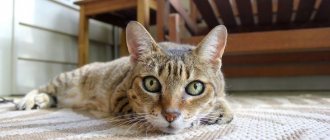With the appearance of a cat in the house, the owners immediately have a lot of pleasant and not so pleasant troubles. Many owners complain that their pets are excessively talkative, which is impossible to cope with. In fact, no pet will scream, meow, or otherwise vocalize constantly. Finding the reason and weaning the cat from yelling becomes the primary task for the owner.
Variety of sounds in cats
With the help of sound signals, animals express their feelings and sensations, communicate with fellow tribesmen and exchange information. The cat's “language” includes a wide and varied audio set, each element of which has its own intonation and emotional coloring.
The domestic mouse can reproduce:
- vibrating purring;
- gentle meow;
- aggressive hissing;
- angry growl;
- long, loud shout
The last sound impact is also described as a “howling scream” and “heart-rending scream”, and its strength and duration often reaches the limit of human patience.
Main reasons. Animal psychologists name 3 reasons for cat loudness:
- instincts and physiological needs;
- boredom and loneliness;
- malaise and pain.
By carefully looking at your pet and identifying provoking factors, you can deal with the problem.
Don't forget to feed your pet!
Hunger is the main reason for the early awakening of your four-legged friend. Not finding food in the bowl, he begins to loudly signal this. So try to fill your cat's bowls before you go to bed. Make sure your pet has a hearty dinner. And do not refuse him a treat if he asks for it in the evening. This will save you energy and nerves. After all, a well-fed cat will not wake you up earlier than expected.
Cases requiring contact with a veterinarian
If a cat constantly meows and itches, then he may have fleas, lice eaters, or other ectoparasites (living outside). Allergies and ear mites may also have such manifestations. It is necessary to show your pet to a doctor to determine the cause of this behavior and determine measures to help.
A hard, inflated belly speaks together with a loud meow, serious anxiety or, conversely, lethargy; increased appetite or its absence indicates a helminthic infestation.
In such cases, you should consult your veterinarian. He will prescribe an anthelmintic and tell you how long to give it.
If the kitten cries loudly and trembles at the same time, you can try to warm it or feed it. If the cause is not hunger and cold, then you need to see a doctor, as this may be damage to the spine.
Refusal to eat, diarrhea, or, conversely, cleanliness in the tray for a long time, accompanied by plaintive and constant meowing, is also a reason to seek medical help.
A caring owner always understands his pet. Cats have almost no means of expressing their complaints or wishes other than by making sound signals. It is important to understand what the pet wants to communicate and provide him with all possible assistance.
The main reasons why cats get restless at night, why do they scream?
If we are talking about uncastrated cats and unsterilized cats, then at such moments their natural desire to reproduce prevails. Therefore, with such cries, representatives of the cat family invite potential soul mates, informing them of their readiness to reproduce.
It may happen that the animal screams because of illness or some kind of ailment that causes him suffering. For older cats, this could be a nervous disorder or Alzheimer's syndrome. Abdominal pain can plague animals of any age. And this can be understood by feeling the pet’s belly - its hardness will clearly indicate that this is the cause of concern. In a cat that has always been calm and suddenly begins to exhibit similar behavior, the cause may be common worms.
Urolithiasis bothers older animals, manifesting itself most strongly after it relieves itself. A clear confirmation of this is the cat's anxiety and screams after he leaves the tray. Neutered cats who have had part of their ovary retained may also experience anxiety and screaming.
Kittens suffering from lack of attention and trying to demand a treat or game from their owner also scream. Moreover, having received what they want, they very quickly remember the method by which they can achieve what they want and use it again and again. In addition, a kitten that has been weaned from its mother and just brought into a new home can behave very restlessly. He may refuse to eat, walk everywhere and scream, calling for his mother. If a kitten screams at night, then over time he will get used to it, adapt and stop such screams.
Also, a cat's screams can mean anxiety. It’s not for nothing that cats’ so-called sixth sense is so acute that since ancient times people have used them to predict various natural disasters, such as earthquakes. The pet's anxiety in this case may have the purpose of warning the owner about something. But such behavior, of course, is not observed every day, but only occasionally.
The possessive nature of cats forces them to mark their territory to prevent other animals from claiming it. But in order to reinforce the marks with more eloquent actions, cats declare their rights with such loud cries.
The reason for screaming is instincts and physiological needs
Living next to humans, domestic cats nevertheless have not lost touch with pristine nature and build their behavior, guided by genetically inherent aspirations. Such an internal “navigator” can completely subjugate and significantly change the usual nature.
Instinct for procreation
The most trivial reason for cat concerts is sexual desire.
Behavior of females. The “basic instinct” is so dominant and strong that zoologists call the time of female sexual activity “estrus,” which means “passion” and “fury.” Representatives of felines not only clearly demonstrate their readiness to mate, but also actively search for a male and literally seduce him. In a house where an unsterilized cat lives, days of estrus are marked by a loss of peace for the whole family, given that in the daily schedule the peak of cat activity occurs in the evening and night.
The inviting cries of the “bride” are accompanied by the following accompanying signs:
- ignoring food;
- frequent visits to the toilet;
- thorough licking of the intimate area;
- visual pose on half-bent legs with arched back and raised tail;
- turning over on your back and rolling on the floor.
Behavior of males. Male cats scream even louder and more intensely, and metaphors in the style of “March serenades” or “demonic screams” are attributed to their concerts. In addition, uncastrated males have a habit of leaving strong-smelling marks anywhere and everywhere, and this tendency only intensifies during the period of cat weddings.
What is the danger? The call of nature is so strong that the mustachioed striped creatures, who have never left the confines of a human home, can suddenly go in search of “their soulmate,” which is fraught with misadventures in the style of:
- falling out of a window;
- death under the wheels of a car;
- injuries in fights with relatives;
- inability to find the way home.
If the gulena does return to the company, then he will most likely bring dubious “gifts” in the form of infections, parasites or unwanted offspring.
What should the owner do? Drops and tablets with hormonal drugs sold in pet stores will help to freeze the sexual activity of cats and stop the unbearable screams. However, abuse of these drugs can lead to undesirable changes in the body, in particular the development of genital tumors. Therefore, the most radical method is the complete sterilization of animals that do not represent breeding value and do not participate in breeding.
Eating behavior
The nuances of food activity are also associated with sound manifestations. There are 3 situations when cat screams are provoked by food:
- pets quickly get used to the daily routine and demand dinner if it is delayed a little;
- a cat spoiled by food refuses the usual food in its bowl, but persistently begs for a treat;
- a well-fed cat does not want to leave the kitchen when food is being prepared for people or the whole family is gathered at the table.
Owner actions. To wean a cat from demanding food, you should adhere to the rules linking the hierarchical rank of the animal with eating behavior:
- exclude the presence of the animal in the kitchen until its bowl is full and takes its usual place;
- after 30 minutes, the remaining food must be removed and the pet must be removed from the kitchen;
- throwing, screaming and scratching outside the door should be coldly ignored;
- in case of refusal of food, the usual portion should not be immediately replaced with a treat - the cat probably decided to give himself a fasting day;
- During a family meal, a pet should not be present in the kitchen, much less behave like a beggar.
This is how, in cat language, imitating relationships in a pride of lions, the status quo is restored, and the cat, as the weakest and lowest member of the community, ultimately resigns itself to the orders established by the leader. If the cat is constantly hungry, then the owner is required to review the diet and feeding standards.
Increased activity at night
Cats are nocturnal predators, so they spend almost the entire daylight hours in a sweet slumber. But as soon as dusk falls, the pet wakes up and is ready to go hunting. Seething energy makes a well-rested and well-fed cat run around the rooms, play mischief, sharpen its claws, play with toys and demand increased attention from sleeping people. Young animals are especially energetic.
The owners, naturally, are not delighted with such a cat routine and try to reason with the pet by force. However, such behavior is just a consequence of a lack of movement and muscle activity.
Daytime physical inactivity.
If a cat wakes up during the day only to eat, lick itself and go to the toilet, then physical inactivity can be diagnosed.
To maintain health, obeying instinct, such a pet is forced to warm up at night, while animals that receive proper physical activity during the day are not active for long in the evenings and sleep peacefully at night.
What to do. You can re-educate a nocturnal predator by changing its daily activity schedule. To do this, you should use the appropriate techniques:
- outdoor games with balls, feather teasers, wind-up mice and laser pointers;
- installation of cat sports complexes, including scratching posts, hammocks, houses and playgrounds at different heights;
- harness training and street walking on a leash;
- practicing commands and circus tricks, in particular the ability to carry small objects in the teeth or walk on the front paws.
Eating behavior
Pets often start screaming at 5-6 in the morning to be fed, and they also become indignant and fight if feeding time is delayed. An animal can cause a scandal when it is given the wrong product for hunting. Other reasons are possible (requires treats, impaired hunger).
Solution
In any case, you need to behave the same:
- Animals should not be allowed into the kitchen during food preparation or human meals;
- throwing, screaming, scratching must be ignored;
- if you refuse food, you cannot exchange it for a treat;
- the treat should not serve as food, it is given to the pet during training;
- the treat is given on a full stomach;
- do not show any reaction to your pet’s howls;
- food intake must be regulated and adhere to an hourly schedule;
- if the pet begins to behave violently, it can be locked in a separate room (toilet) and placed on the landing.
Diseases and conditions requiring medical attention
A kitten may cry and meow loudly because something hurts. The cause of pain may be poor digestion or a serious illness. It is necessary to carefully examine the pet and observe its behavior.
The following symptoms should alert the owner:
- increased body temperature, dry nose (in cats the normal temperature is about 38 degrees, in a kitten this figure can vary significantly, since the process of thermoregulation has not yet been established);
- prolonged cleanliness in the tray or, conversely, diarrhea;
- blood in the urine or stool;
- vomit;
- loss of appetite or complete refusal to eat;
- discharge of various types from the eyes, ears;
- swollen, hard tummy;
- impaired coordination of movements.
You should also observe how often the kitten itches. If he constantly bites himself, gnaws something in his fur, or scratches himself heavily, this is a sign of infection with ectoparasites. If these symptoms appear, you should immediately show the animal to a veterinarian. He will determine the cause and prescribe the necessary treatment.
Urolithiasis (UCD)
This is a common pathology among cats. Cats suffer from it relatively rarely. Males are predisposed due to the structural features of the urethra. Firstly, it is too narrow, and secondly, it is tortuous. With urolithiasis, stones and sand form in the bladder. The former cause irritation and take up extra space. The latter clog the urethra, complicating the outflow of fluid.
Important! The result of ICD is a ruptured bladder, the painful death of a cat .
Causes of urolithiasis: poor diet, lack of vitamins, obesity, metabolic disorders. As a result, the acidity of the urine changes, due to which elements (salts or, conversely, proteins) begin to quickly precipitate. As a result, sand and stones are formed, which cause urolithiasis.
Symptoms of urolithiasis:
- the cat tries to go to the toilet a little at a time, but he can’t defecate;
- an important symptom is the pot is dry;
- urine is concentrated, amber-yellow, with a pungent odor;
- constant licking of the groin area;
- there is blood in the urine;
- the pet is lethargic and refuses food;
- body temperature rises;
- palpation of the abdomen reveals a distended bladder;
- X-ray shows stones in the bladder area.
Solution
First of all, you need to visit a veterinarian so that the doctor chooses and prescribes a treatment method. To remove urine through surgery, a catheter is inserted for several days, and a collar is also put on to prevent the cat from licking the perineum.
To resolve urinary stones, a diet is prescribed. Special food is purchased at pet stores. There are veterinary products that should be used separately for oxalate or struvite stones. It rarely happens that stones are removed by surgery.
Anti-inflammatory drugs, painkillers, and diuretics are also prescribed. The veterinarian prescribes pharmaceutical preparations of medicinal herbs. It is necessary to understand that the pathology returns if the cause is not eliminated. Therefore, a diet is prescribed, and the cat must also be walked so that it moves.
The reason for screaming is boredom and loneliness
A pet, accustomed to sleeping in bed next to its adored owner, will experience great disappointment when it finds itself outside its cozy “den.” If the owner decides to accustom the kitten to a personal bed, then this should be done very gradually, first by installing a house, hammock or basket in the bedroom. The process of luring a cat to the bed also contains several secrets, including the use of:
- treats that guarantee long-lasting chewing pleasure (for example, chewing sticks, a piece of meat with cartilage, or a whole sea fish);
- favorite toys;
- catnip.
And only after time has passed, when the pet has learned to sleep alone, the bed can be taken outside the bedroom.
Loneliness. The most striking manifestation of irrepressible screams of a psychological nature is the period when a lonely pet remains locked in an apartment. This happens when the owner:
- goes to work;
- goes on a business trip;
- ends up in the hospital;
- is delayed in absence for one reason or another.
Separation is especially difficult for small kittens that need constant attention, and affectionate, affectionate animals with a strong emotional connection with the owner.
What to do. To alleviate stress, felinologists recommend purchasing effective entertainment for the mustachioed-striped cat with which he could entertain himself while his owner is away, namely:
- bouncing balls, auto-winding mice, interactive toys;
- chewing sticks;
- automatic feeders that release several tidbits after a certain period of time;
- cat play complexes;
- indoor aquarium with live fish or its imitation.
High activity at night
Cats are nocturnal animals. Therefore, when the sun sets, they begin to run around the apartment, play wildly, drop objects, meow, howl, and demand feeding. It is a completely natural behavior that is present to a greater or lesser extent in all cats.
Solution
There are 2 possible strategies:
- Drive the cat out into the street, onto the landing, into the room at night, outside the door. Let him seek adventure if he wants. Some owners do this. Their pets constantly walk at night and during the day, hunt pigeons, fight with cats, and run from dogs.
- Accustom your pet to a daily lifestyle. To do this you need to play with him. Use laser pointers, jingling balls, radio-controlled cars, mice, and teasers. This is purchased at a veterinary pet store. Owners also walk their pet on a leash during the day. Of course, in the evening the toys and bells are removed and the scratching post is left behind.
The border is under control
We know well that a cat is a territorial animal and will spend its entire life inspecting its possessions and updating its marks.
But please tell me, how can one understand what is going on, for example, in a closet if the door there is closed? A cat's senses are excellently developed, but not enough to see through a closed door.
And it is possible that there (that is, behind a closed door) a competitor has appeared who needs to be driven away immediately!
When you can’t stand it and open the door, your pet either doesn’t move at all, or is limited to a quick glance and a couple of deep breaths.
What was it? The cat did “visual and chemical tests” of the space and made sure everything was in order.
Ideally, all rooms should be accessible to her at any time of the day or night. But if there is a forbidden one (the same closet), then your pet should never cross its threshold. This way he won’t consider this room his territory and try to control it.
Is it possible and how to train a cat not to disturb sleep?
There is no simple and clear way to solve the problem of early rises. The training procedure is complex and lengthy. But if you are pretty tired of cat songs in the morning, then you should try.
Action plan for teaching an animal to silence:
- First, you should mentally prepare yourself and your family for the long journey. After all, the procedure can take at least a month.
- Prepare a spray bottle of water next to the bed.
- When in the morning a cat tries to attract attention to itself and starts jumping on the bed and meowing, you need to lightly spray its curious face with water. Temporary effect is guaranteed.
- It is advisable to close the doors to all rooms except yours. Or provide all apartment residents with sprayers.
- Under no circumstances should you show signs of attention to the animal. Even if it pretends to be suffering terribly and howls heart-rendingly somewhere next to the bowl. Scratching behind the ear, stroking, talking should be done at any other time, but not during the morning “hysterics”. It is only acceptable to splash water when trying to “scream” over the ear.
- Develop and establish a clear meal schedule, taking into account weekends. Food should only be provided at specific times.
- Strictly monitor the implementation of all points of this plan. And do this until the cat stops waking you up in the early morning.
- If at least once one of the family members gives up, the training will have to start from the very beginning. Please note that doing this again will be much more difficult.
Over time, the cat will remember that she will definitely be given enough attention and fed her favorite food, but not under the pressure of her heart-rending cries, but when the time comes.
Latest Chinese warning
It is possible that you are busy and cannot devote much time to your pet. At least as much as he needs. He may choose this method (by the way, not the most outrageous one) to remind you of your responsibilities: playing together, talking, ironing the back and scratching behind the ear.
As you can see, there is no paradox or mythical cat harmfulness in the “closed door syndrome”!
Subscribe to our channel and learn more interesting and useful things about cats!
Nocturnal lifestyle
Before moving on to the reasons for unwanted behavior in cats, it should be remembered that all felines are active primarily at night or in the early morning hours. This rhythm of life gave wild cats an advantage over prey and other predators, which were less active after sunset.
Cats' visual organs are also geared towards a nocturnal lifestyle; they function even worse in illuminated conditions than in twilight. In a word, even cat physiology is on the side of their activity from dusk to dawn.
For wild cousins of domestic cats, night hunting is a way of survival
However, the millennia lived side by side with humans were not in vain for cats. Pets, in the process of long evolution, have learned to adjust their rhythms of life to human rhythms. Nowadays, it is not uncommon to find cats sleeping side by side with humans. But you need to keep in mind that cat sleep has little in common with human sleep.
Instead of sleeping once a day, cats take short naps of a few minutes each.
Cats sleep very lightly and often wake up, since full, deep sleep is an unaffordable luxury for them. Wild cats couldn’t afford it and slept in “portions.” This sleep order was passed on to their distant domestic descendants.
How to stop a cat from scratching furniture using improvised means?
Fill the spray bottle with water. And as soon as your pet starts tearing up the sofa or other unauthorized place, sprinkle water on it! There will be no harm to either the cat or the furniture, but the pet will begin to associate its favorite activity with unpleasant phlegm!
If you are thinking about how to stop a kitten from scratching the sofa, then this method is unlikely to work. Usually, kids accidentally damage furniture while playing. They begin to climb the curtains, try to conquer the sofa, the carpet hanging on the wall - this is normal behavior. If you pour water on your kitten every time he plays, you will simply grow a nervous creature, apathetic to everything. The same applies to scaring sounds.
How to determine the age of a kitten?
The surest way to determine the age of a kitten is by looking at its teeth. Babies are born without them. The first to appear are the deciduous incisors—the small front teeth—this occurs at 2-3 weeks of a kitten’s life. After them come the fangs - long wedges on the sides of the incisors; they erupt at 3-4 weeks.
Interesting materials:
How much does it cost to advertise on Tik Tok for bloggers? How much does a kindergarten cost in Moscow 2022? How much does the most expensive sports car in the world cost? How much is a fine for a belt? How much is a tachograph fine? How much does it cost to enroll a child in 1st grade 2022? How much does it cost to file a statement of claim in the Novosibirsk court? How much does it cost to make a will in Kyiv? How much does ricotta cheese cost? How much does a Simple transfer cost?
Will sterilization help?
As we wrote in the first paragraph, cats mark their territory by leaving their scent and marks. As many people know, if you sterilize an animal, it loses interest in the opposite sex. But sterilization will not help overcome the instinct to mark oneself with claws!
Yes, it is necessary to sterilize pets; this will protect them from many diseases and prolong their lives. You, in turn, will not need to listen to cat concerts or think about what to do with the offspring. How to stop a cat from scratching furniture and wallpaper? There are other productive methods.
A cat meows in the morning for two reasons:
- A cat's meowing in the morning is provoked by its feline nature. His internal clock and the nocturnal nature of his ancestors make the cat get up early in the morning. The cat will wake up later or earlier depending on the time of dawn. In the summer, when the sun rises early and the cat can wake up very early, and during the long winter nights he can sleep until lunch every day.
- The reason that stimulates the cat to meow in the morning may be your incorrect response to his demands. If your cat meows in the morning and you reward him with your attention, then you will have to continue to do this day after day. If the cat asks to eat or it seems to you that he is tearing up the furniture, at the same time you jump out of bed and start chasing him around the apartment or go to the kitchen to feed him, and tomorrow, when the cat starts meowing in the morning, you pretend that you don’t hear, then you will not be able to stop him from waking you up in the morning. No amount of “fighting back” methods will help stop the cat from meowing in the morning; he will continue to express his demands. On the contrary, with this behavior you encourage the cat to intensify the game, which is very tempting for him than the constant attention shown to him.
How to avoid what is predicted in omens
The most important thing in communicating with cats is good intentions and care. You should not anger the cat, mock, or neglect the animal. If he feels unnecessary, then one way or another he will leave the life of a superstitious person, but he will also take everything that is his – protection, warmth and comfort.
Signs about cats are very peculiar in nature. They promise warmth and cold, additions to the family and illness. They treat everyone who is possible, but they also honestly indicate with whom things will be difficult. For a cat to protect the house, all he needs is to eat and feel loved.
Psychological reasons
The following reasons are not related to the physical, but only to the psychological state of the pet. Among them, the following should be highlighted.
Yearning. It is most often experienced by kittens that have recently been weaned from their mother. They behave restlessly, wander around the house in search of their mother and meow pitifully. The owners need to cuddle the babies, give them more attention, calm them down, and then they will stop being nervous. Extortion. The night cry of a cat for no apparent reason indicates simple extortion on his part. Most often, cats try to beg their favorite treat from their owners. If you treat him with delicious food and monitor his further reaction, you can easily figure out this tricky trick. Having received what he wanted, the cat will instantly calm down and stop screaming. But in the future, you shouldn’t give the cat a treat every time it screams, otherwise the owners won’t have a restful sleep. To attract attention
Cats that are alone all day try to attract the attention of their owners at night. The cat jumps onto the bed of a small child or at the head of the owner, starting to scream near the ear
He just wants to chat or play with him, since during the day he does not have such an opportunity. On weekends, it is advisable to pay more attention to your pet and then the problem will solve itself. Sense of anxiety. Being in a state of tension, cats often scream not only at night, but also in the morning. Most often, they sense something wrong and try to warn the owner. There are cases where cats, with their restless behavior, predicted earthquakes and other natural disasters.
Sticky surfaces
How to stop a cat from scratching the sofa? Just let it stick once or twice! Attach double-sided tape to the upholstery. As soon as the animal approaches to scratch its favorite place, it will immediately stick its paw or fur on its side. Cats hate being clingy, so you won't need a lot of lessons.
Place the tape in all places where the cat sticks its claws - the window sill, corners, doors, and so on. Soon the animal will avoid dangerous places three meters away!
Don't use aggressive parenting methods
Don't yell at the animal or hit it. Severe stress will negatively affect his health. Mental illness can also lead to physical illness. Gradually accustom your cat to her sleeping place if you do not want her to sleep with you. The incentive method is quite suitable for this. For every correct action, give the animal a treat. For pranks, you can be deprived of a treat, but not the main food. It is best to start training if your pet has problems with discipline.
Veterinarian recommendations
Of course, sometimes it seems that you have taken all the measures - fed, watered, caressed, survived the sterilization period, and the cat still screams at night, but even in this case you should not give up.
Only patience and education will help you cope with a noisy pet.
But under no circumstances should violent measures be used against an animal. After all, a cat is a very intelligent creature; it has a sense of revenge. And how she will take revenge is unknown. In addition, cats are also proud animals; they will not tolerate any violence against themselves; it is impossible to achieve obedience from her using force. If you have tried all the remedies, contact a zoopsychologist, and show patience and attention yourself. Only in this case is it possible to obtain a positive result.











